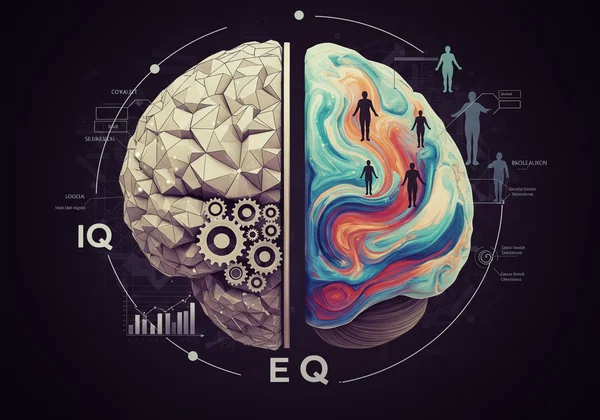EQ Test: Why Emotional Intelligence Matters More Than IQ
July 21, 2025 | By Isla Caldwell
For decades, we’ve been taught that the Intelligence Quotient (IQ) is the ultimate measure of potential. It has been the gold standard for academic achievement and a predictor of who gets the top jobs. But a quiet revolution has been happening, revealing a more powerful force in determining success and happiness: Emotional Intelligence (EQ). So, is high EQ or IQ better? This guide explores why a strong EQ test result can be a more meaningful indicator of a fulfilling life than a high IQ score.
Emotional intelligence is the ability to understand, use, and manage your own emotions in positive ways to relieve stress, communicate effectively, empathize with others, overcome challenges, and defuse conflict. It's the human side of intelligence. If you're ready to understand your own emotional landscape, the first step is to discover your EQ score and begin a journey of profound self-insight.

Emotional Intelligence vs. IQ: Understanding the Core Differences
While both IQ and EQ contribute to who we are, they govern very different aspects of our abilities. IQ is about what you know and how fast you can learn it. EQ is about who you are and how you interact with the world around you. This fundamental difference is why understanding emotional intelligence vs IQ is critical for personal and professional development.
Defining IQ: Cognitive Aptitude and Its Role
Your Intelligence Quotient, or IQ, is a score derived from standardized tests designed to assess human intelligence. It primarily measures your cognitive aptitude—your ability to reason, solve problems, think abstractly, and comprehend complex ideas. A high IQ often correlates with strong academic performance and proficiency in technically demanding fields. It’s the raw processing power of your brain, excellent for learning languages, understanding mathematical concepts, and retaining information. However, it says very little about how you handle pressure or collaborate within a team.
Defining EQ: The Power of Understanding Emotions
Emotional Intelligence (EQ), on the other hand, is the capacity for understanding emotions—both your own and those of others. It encompasses five core skills: self-awareness, self-management, motivation, empathy, and social skills. EQ is what allows you to recognize when a colleague is feeling overwhelmed and offer support, or manage your own frustration during a difficult project. It’s the foundation of effective leadership, strong relationships, and personal resilience. While IQ might get you the job interview, your EQ is what will help you thrive once you're there.
Is High EQ or IQ Better for Overall Success?
This pivotal question guides our understanding: While a high IQ can certainly open doors, many experts now believe EQ is the key to walking through them successfully and building a meaningful life. Think of it this way: IQ is your potential on paper, but EQ is how you apply that potential in the real world. For overall success, which includes career satisfaction, stable relationships, and mental well-being, a high EQ often proves to be the more valuable asset. The journey to a better you starts with self-awareness, and you can take a free eq test to get a clear picture of where you stand.

Why EQ is Important: Beyond Academic & Technical Prowess
The conversation is shifting from what you know to how you act. In today’s interconnected world, technical skills alone are not enough. The reason why EQ is important is that it governs the very qualities that make us effective humans—in our personal lives, our communities, and our workplaces. It’s the secret ingredient that separates good from great.
Enhancing Personal Growth & Mental Well-being
High EQ is intrinsically linked to self-awareness, the ability to recognize and understand your own moods and motivations. This insight is the cornerstone of personal growth. When you know why you feel a certain way, you can manage your reactions, reduce stress, and make choices that align with your long-term goals. This emotional clarity fosters confidence and resilience, contributing directly to improved mental well-being and a more positive outlook on life. Knowing your emotional intelligence score can be the first step in this empowering process.
Mastering Relationships with Empathy and Social Skills
Humans are social creatures. Our success and happiness depend heavily on the quality of our relationships, and these are built on a foundation of empathy and social skills. Empathy allows you to understand the needs and perspectives of others, fostering trust and connection. Strong social skills enable you to communicate clearly, inspire others, and navigate complex social situations with grace. These abilities are essential for everything from nurturing a friendship to leading a successful team.
Can a Person Have High IQ But Low EQ? Exploring the Disconnect
It is entirely possible, and we have all likely encountered someone who fits the profile of having a high IQ but low EQ. This is the brilliant engineer who can’t communicate with their team, the genius analyst who alienates colleagues with their lack of empathy, or the academically gifted student who struggles with social anxiety. This disconnect highlights that cognitive intelligence does not automatically translate into emotional maturity. Without a developed EQ, even the brightest individuals can find their potential capped by poor interpersonal skills and an inability to manage their own emotional world.

The Benefits of EQ: Unlocking Success in Life and Career
Investing in your emotional intelligence yields tangible returns in nearly every facet of your life. The benefits of EQ are not just soft skills; they are practical tools that unlock better performance, stronger connections, and greater resilience. From the boardroom to the living room, a higher EQ provides a distinct advantage. If you're curious about your own strengths, it's easy to test my eq and get instant feedback.
Boosting Career Advancement & Effective Leadership
In the professional world, EQ is a powerful catalyst for effective leadership and career advancement. Leaders with high emotional intelligence are better at motivating their teams, providing constructive feedback, and creating a positive work environment. They can navigate office politics, build strong networks, and inspire loyalty. Companies are increasingly recognizing this, prioritizing candidates who demonstrate strong interpersonal skills alongside technical competence. An EQ test for leaders is becoming a common tool for identifying high-potential managers.

Improving Communication & Resolving Conflict Constructively
Misunderstandings and conflicts often stem from a breakdown in emotional communication. High EQ provides the tools for improving communication by helping you listen actively, express yourself clearly, and read non-verbal cues. When disagreements arise, emotional intelligence allows you to stay calm, understand the other person’s viewpoint, and work towards a constructive resolution rather than letting tempers flare. This skill is invaluable in both professional and personal settings.
Building Resilience & Managing Stress More Effectively
Life is full of challenges, and our ability to cope with them depends on our emotional resilience. A key benefit of EQ is building resilience by improving self-regulation. It allows you to manage stress without becoming overwhelmed, to stay optimistic in the face of setbacks, and to bounce back from adversity stronger than before. This emotional fortitude is crucial for maintaining performance under pressure and protecting your long-term mental health.
Unlock Your Full Potential: Start Your EQ Journey Today
Your emotional intelligence isn't just a beneficial trait; it's a core component of success, happiness, and a fulfilling life. Ready to tap into its power? Understanding your current EQ is the essential starting point – it's your personalized roadmap for self-improvement. Stop wondering and start discovering your true potential. Start Your EQ Test today and embark on your journey to a more emotionally intelligent you.
Frequently Asked Questions About Emotional Intelligence
What is emotional intelligence?
Emotional intelligence (EQ) is the ability to perceive, evaluate, and manage your own emotions and the emotions of others. It involves skills like self-awareness, self-regulation, empathy, and effective social interaction, which are crucial for success in both personal and professional life.
How do people with high EQ behave?
People with high EQ are typically great listeners, self-aware, and empathetic. They remain calm under pressure, think before they act, are open to feedback, and can communicate their feelings constructively. They are skilled at building and maintaining positive relationships because they understand social dynamics and the feelings of those around them.
What are the benefits of an EQ test?
The primary benefit of an EQ test is gaining self-insight. It provides you with a baseline measurement of your emotional intelligence, highlighting your natural strengths and areas that may need development. Taking an accurate eq test is the first step toward creating a targeted plan to improve your emotional skills, leading to better relationships, career success, and overall well-being.
Can I raise my EQ?
Yes, definitely. Unlike IQ, which is relatively stable throughout life, EQ is a flexible set of skills that can be learned and improved with practice. By focusing on areas like active listening, managing your reactions, and trying to understand others' perspectives, you can significantly increase your emotional intelligence over time.
Is high EQ or IQ better?
While both are valuable, a high EQ is often a better predictor of life success and happiness than a high IQ. IQ might help you solve complex problems, but EQ helps you navigate the complexities of human interaction, manage stress, and motivate yourself and others. The ideal is a healthy balance of both, but for navigating the real world, a strong EQ is indispensable.